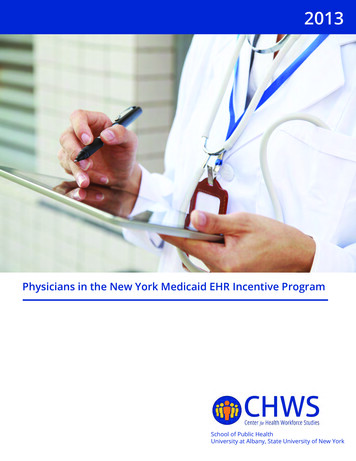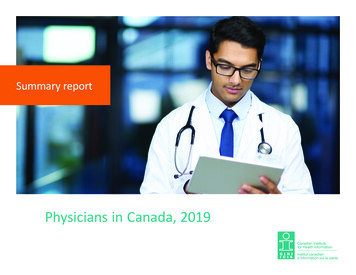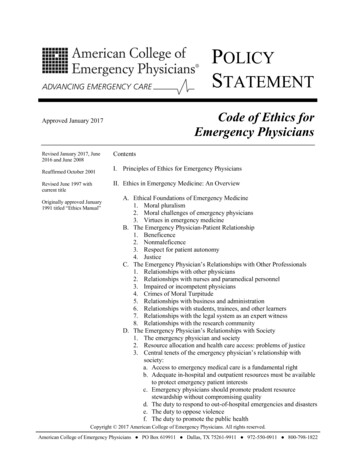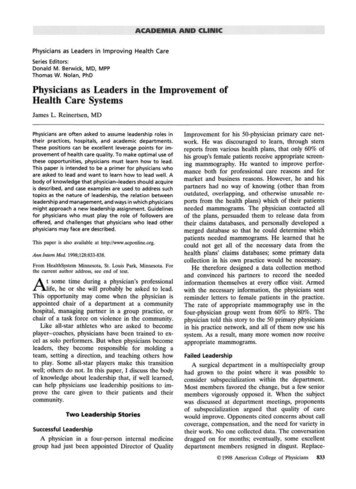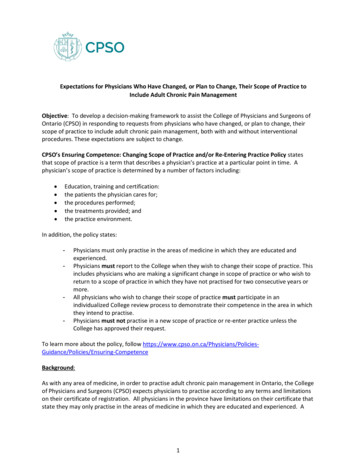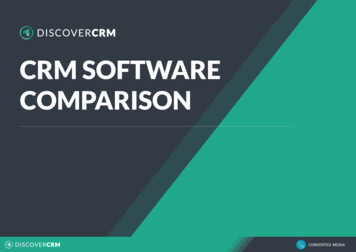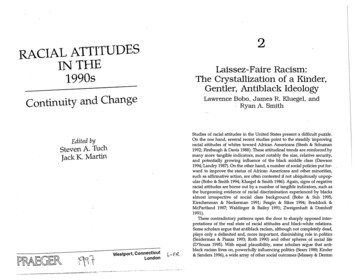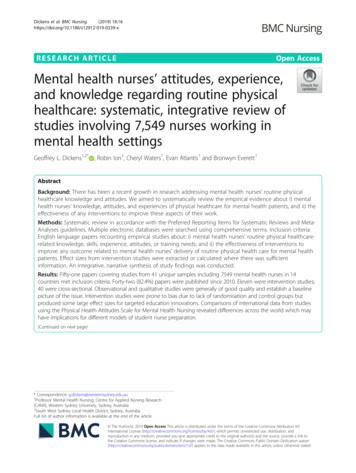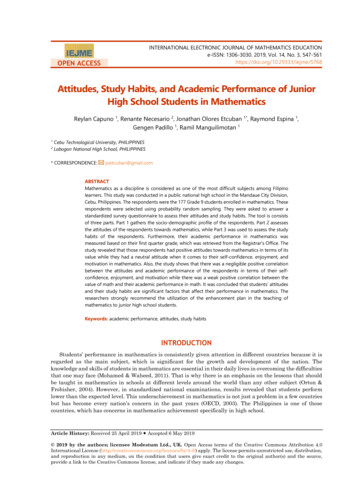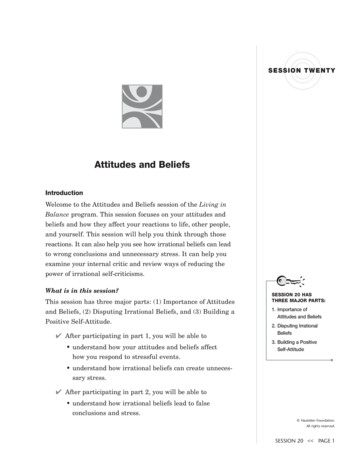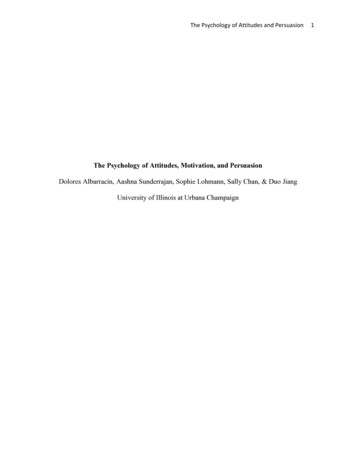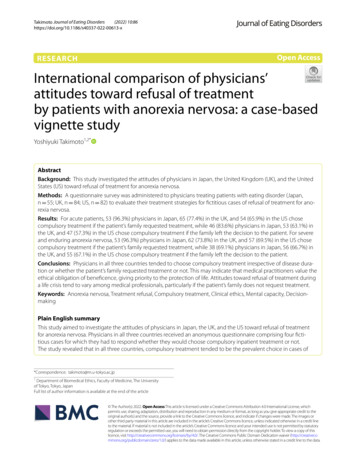
Transcription
(2022) 10:86Takimoto Journal of Eating xOpen AccessRESEARCHInternational comparison of physicians’attitudes toward refusal of treatmentby patients with anorexia nervosa: a case‑basedvignette studyYoshiyuki Takimoto1,2*AbstractBackground: This study investigated the attitudes of physicians in Japan, the United Kingdom (UK), and the UnitedStates (US) toward refusal of treatment for anorexia nervosa.Methods: A questionnaire survey was administered to physicians treating patients with eating disorder (Japan,n 55; UK, n 84; US, n 82) to evaluate their treatment strategies for fictitious cases of refusal of treatment for anorexia nervosa.Results: For acute patients, 53 (96.3%) physicians in Japan, 65 (77.4%) in the UK, and 54 (65.9%) in the US chosecompulsory treatment if the patient’s family requested treatment, while 46 (83.6%) physicians in Japan, 53 (63.1%) inthe UK, and 47 (57.3%) in the US chose compulsory treatment if the family left the decision to the patient. For severeand enduring anorexia nervosa, 53 (96.3%) physicians in Japan, 62 (73.8%) in the UK, and 57 (69.5%) in the US chosecompulsory treatment if the patient’s family requested treatment, while 38 (69.1%) physicians in Japan, 56 (66.7%) inthe UK, and 55 (67.1%) in the US chose compulsory treatment if the family left the decision to the patient.Conclusions: Physicians in all three countries tended to choose compulsory treatment irrespective of disease duration or whether the patient’s family requested treatment or not. This may indicate that medical practitioners value theethical obligation of beneficence, giving priority to the protection of life. Attitudes toward refusal of treatment duringa life crisis tend to vary among medical professionals, particularly if the patient’s family does not request treatment.Keywords: Anorexia nervosa, Treatment refusal, Compulsory treatment, Clinical ethics, Mental capacity, DecisionmakingPlain English summaryThis study aimed to investigate the attitudes of physicians in Japan, the UK, and the US toward refusal of treatmentfor anorexia nervosa. Physicians in all three countries received an anonymous questionnaire comprising four fictitious cases for which they had to respond whether they would choose compulsory inpatient treatment or not.The study revealed that in all three countries, compulsory treatment tended to be the prevalent choice in cases of*Correspondence: takimoto@m.u-tokyo.ac.jp1Department of Biomedical Ethics, Faculty of Medicine, The Universityof Tokyo, Tokyo, JapanFull list of author information is available at the end of the article The Author(s) 2022. Open Access This article is licensed under a Creative Commons Attribution 4.0 International License, whichpermits use, sharing, adaptation, distribution and reproduction in any medium or format, as long as you give appropriate credit to theoriginal author(s) and the source, provide a link to the Creative Commons licence, and indicate if changes were made. The images orother third party material in this article are included in the article’s Creative Commons licence, unless indicated otherwise in a credit lineto the material. If material is not included in the article’s Creative Commons licence and your intended use is not permitted by statutoryregulation or exceeds the permitted use, you will need to obtain permission directly from the copyright holder. To view a copy of thislicence, visit http:// creat iveco mmons. org/ licen ses/ by/4. 0/. The Creative Commons Public Domain Dedication waiver (http:// creat iveco mmons. org/ publi cdoma in/ zero/1. 0/) applies to the data made available in this article, unless otherwise stated in a credit line to the data.
Takimoto Journal of Eating Disorders(2022) 10:86Page 2 of 8life-threatening malnutrition, regardless of the patient’s age or duration of illness. Moreover, in all the three countries,treatment tended to be forced if a family member requested treatment, and this trend was particularly strong inJapan. The influence of family request was stronger for acute AN in the U.K. and the U.S., and for SE-AN in Japan.BackgroundRefusal of treatment can be a challenge for the treatment of eating disorders [1]. Obtaining informed consent from the patient is a prerequisite for performingcertain therapeutic actions, such as hospitalization ornasogastric tube feeding, and the refusal of treatmentby patients with eating disorders hampers treatmentinitiation. Particularly, refusal of treatment by lowweight patients with anorexia nervosa (AN) who needurgent medical treatment makes the management ofsuch cases challenging. Furthermore, compulsory treatment needed to save a patient’s life regardless of thepatient’s wishes entails ethical concerns. For example,if a patient refuses treatment even when it is necessary,prioritizing the protection of life would infringe thepatient’s self-determination. Legal disputes and ethicaldebates have been raised on whether coercive treatment should be administered to patients with AN whorefuse treatment. [2]. However, there are currently noguidelines or definitive opinions on the subject.In Japan, the United Kingdom (UK), and the UnitedStates (US), patients with mental disorders who are atrisk of self-injury or other harm can be legally and forcibly hospitalized, even if they do not consent to inpatient treatment [3]. In Japan, a system of hospitalizationfor medical protection allows treatment to be administered to a patient who is not in a condition to consentto treatment, even if there is no fear of self-injury orother harm; however, this is only done with the consentof the patient’s guardian [4]. This system of hospitalization for medical protection is different from those inWestern countries, which emphasize the patient’s rightto self-determination, as underscored by the requirement for informed consent.The attitudes of medical professionals toward refusalof treatment by patients with AN may possibly differbetween Japan, the US, and UK due to differences incultural [5] and legal [6] backgrounds. Various opinionshave been expressed on the compulsory treatment ofpatients with AN who refuse treatment from the perspective of law and medical ethics [7]. However, thepriorities for physicians and the attitudes they adoptwhen managing refusal of care by patients with lifethreatening AN are unclear. Thus, this study aimed toevaluate the attitudes of expert physicians in Japan, theUK, and the US on refusal of treatment by patients withAN.MethodsAn anonymous self-administered questionnaire surveywas delivered by mail to 212 members of the JapaneseSociety for Eating Disorders, while an anonymous webbased questionnaire with similar questions created bydouble translation was administered to eating disorderspecialists in the US and the UK. In the US, the webbased survey was conducted among physicians registeredwith MD.Linx (more than 415,000 doctors in total) whoare members of eating disorder-related societies, such asthe Academy of Eating Disorder and who practice eating disorder treatment. In the UK, the web-based surveywas conducted among doctors registered with Doctors.net.uk (over 200,000 doctors in total) who are membersof eating disorder-related societies, such as the BritishEating Disorder Academy, and who practice eating disorder treatment. The web survey was conducted through asurvey company that solicited responses until more than80 responses were collected, assuming the maximumresponse rate in Japan was 40%. In both the US and theUK, three announcements encouraging cooperation inthe survey were made over a six-week period.Four fictitious vignette cases were used in the study,each comprising a combination of two different patientconditions (Case A and B) and two different reactionsof the patients’ families. The respondents were askedwhether they would choose compulsory inpatient treatment or not (see Additional file 1). Case A is acute anorexia nervosa and Case B is severe and enduring anorexianervosa defined by clinical severity, treatment failure orresistance, and chronicity [8]Statistical analysisχ2 test was used to examine the differences in the physicians’ responses in the three countries. If the χ2 test resultwas significant, χ2 test or Fisher’s direct method wasused to analyze the differences in the responses betweentwo countries, and Bonferroni’s correction was applied.p 0.01 was considered statistically significant.McNemar’s test was used to test the tendency of individual responses of physicians from each country tochange between Case A and Case B and to test whetherthe individual responses changed depending on whetherthe patient’s family requested treatment or not.All analyses were two-tailed and p value 0.05 was considered statistically significant.
Takimoto Journal of Eating Disorders(2022) 10:86Page 3 of 8Ethical considerationsThis study was approved by the Ethics Committee ofthe Faculty of Medicine, The University of Tokyo (No.3938-1).ResultsGeneral characteristics of the respondentsFifty-five valid responses were obtained from physicians in Japan who specialize in treating eating disorders(25.9% response rate). The physicians included 21 psychosomatic physicians, 24 psychiatrists, and 10 adolescent medicine physicians. Psychosomatic physicians aretrained in internal medicine with additional psychiatricpsychosomatic trainings and both psychosomatic physicians and psychiatrists mainly treat eating disorders inJapan. Most physicians had 10 to 19 years of experience,while some had more than 30 years of experience. Mostphysicians treated 50 to 99 patients in a year, while sometreated 150 to 199 patients in a year (Table 1).Eighty-four valid responses were obtained from physicians in the UK. All respondents were psychiatrists.Among the physicians who responded, 28.2% worked inclinics that specialized in treating eating disorders, 24.7%worked in hospitals that specialized in treating eatingdisorders, and 57.0% worked in other medical facilities.Most physicians had 10 to 19 years of experience, whilesome had 20 to 29 years of experience. Most physicianstreated 20 to 49 patients for eating disorders per year,while some treated 50 to 99 per year.Eighty-one valid responses were obtained from physicians in the US. All respondents were psychiatrists.Among the physicians who responded, 44.7% worked inclinics that specialized in treating eating disorders, 16.5%worked in hospitals that specialized in treating eatingdisorders, and 38.8% worked in other medical facilities.Most physicians had 10 to 19 years of experience, whilesome had 20 to 29 years of experience. Most physicianstreated 50 to 99 patients per year, while some treated 100to 149 patients per year.The total number of samples from the three countriesrequired for statistical analysis was 90, and this value wascalculated by setting the difference at 40 points in accordance with previous studies [9], with α 0.05 and β 0.1using POWER PROCEDURE of SAS.Comparison of responses from Japan, the UK, and the USFor young patients with acute AN, 53 (96%) physiciansin Japan, 65 (77%) in the UK, and 54 (66%) in the USindicated that they would choose compulsory inpatienttreatment if the patient’s family requested treatment. Asignificant bias was present in the response rates in thethree countries. Bilateral comparison showed significantdifferences between the responses from Japan and thosefrom the UK (p 0.003) and between those from Japanand those from the US (p 1.3 10–4) (Table 2).Forty-six (84%) physicians in Japan, 53 (63%) in the UK,and 47 (57%) in the US responded that they would choosecompulsory inpatient treatment if the patient’s family leftthe decision to the patient. Additionally, a significant biaswas detected in the response rates in the three countries.Bilateral comparison showed that there was a significantdifference between the responses from Japan and thosefrom the UK and between the responses from Japan andthose from the US (Table 2).For older patients with severe and enduring AN, 53(96%) physicians in Japan, 62 (74%) in the UK, and 57(70%) in the US indicated that they would choose compulsory inpatient treatment if the patient’s family wantedto initiate treatment. A significant bias was found inthe response rates in the three countries. BilateralTable 1 Characteristics of the respondentsYears of experience as a clinician 5 years5–9 years10–19 years20–29 years 30 yearsJapan (n 55)081912162850186US (n 82)41736205UK (n 84)Number of AN patients examined in a year 20 patients20–49 patients 50–99 patient100–149 patients 150–199patients200–299patients 300patientsJapan (n 55)0819121600046218234US(n 82)004122487UK (n 84)UK United Kingdom, US United States of America, AN anorexia nervosa
Takimoto Journal of Eating Disorders(2022) 10:86Page 4 of 8Table 2 The proportion of physicians in Japan, the UK, and the US who chose involuntary inpatient treatment in four situationsAcute patients with ANSevere and enduring patients with ANPatient’s family Patient’s family did notrequestedrequest treatmenttreatmentMcNemar’s ent’s family did notrequest treatmentMcNemar’s testP-valueCT53 (96%)ab46 (84%)cd53 (96%)ef38 (69%)RW2 (4%)9 (16%)p .1252 (4%)17 (31%)p 1.2 10 4CT65 (77%)a53 (63%)c62 (74%)e56 (67%)RW19 (23%)31 (37%)p .00122 (26%)28 (33%)CT54 (66%)b47 (57%)d57 (69%)f55 (67%)RW28 (34%)35 (43%)χ2 16.987;df 2;p 2.1 10 4χ2 14.656; df 2; p .005Japan(n 55)UK(n 84)US(n 82)χ2 testP valuep .02225 (31%)27 (33%)χ2 16.556;df 2; p .002χ2(2) 0.565; df 2; p .754p .063p .022CT choice of compulsory inpatient treatment, RW respect for patient’s wishes, UK United Kingdom, US United States of Americaabcdefp .003 by Fisher’s exact testp 1.3 10 4 by Fisher’s exact testp .008 by χ2 16.987; df 1p 4.9 10 4 by Fisher’s exact testp .001, Fisher’s exact testp 4.9 10 4 by χ2 15.703; df 1comparison showed that there was a significant difference between the responses from Japan and those fromthe UK and between those from Japan and those from theUS.Thirty-eight (69%) physicians in Japan, 56 (66%) in theUK, and 55 (67%) in the US responded that they wouldchoose compulsory inpatient treatment if the patient’sfamily left the decision to receive treatment to thepatient. No significant bias was present in the responserates in the three countries.Comparison of response trends in each countryFor young patients with acute AN, no difference wasfound between the tendency for individual physiciansin Japan to choose compulsory treatment if the patient’sfamily wanted to initiate treatment and the tendency forthem to choose compulsory treatment if the family leftthe decision to the patient. However, a significant difference was detected in the propensity of physicians inthe UK and in the US to choose compulsory treatment(Table 2).For older patients with severe and enduring AN, a significant difference was revealed between the tendencyfor individual physicians in Japan to choose compulsorytreatment if the patient’s family wanted to initiate treatment and the tendency for them to choose compulsorytreatment if the family left the decision to the patient.However, no significant difference was present in thetendency for physicians in the UK and the US to choosecompulsory treatment.No significant differences were found between thechoices of physicians for young and older patients if family members requested treatment or if the patient’s family members left the decision to receive treatment to thepatient.Comparison based on years of physician experienceand number of case experiencesThe differences in attitudes by years of experience andnumber of cases treated were examined among physicians in the UK and the US, where the trends weresimilar. No significant difference in attitude was foundbetween physicians with more than 20 years of experience and those with less than 10 years of experience.Additionally, no significant difference in attitude wasdemonstrated between physicians who saw more than100 cases per year and those who saw less than 30 casesper year (Table 3).
Takimoto Journal of Eating Disorders(2022) 10:86Page 5 of 8Table 3 Differences in attitudes based on years of physician experience and number of case experiencesPatients with acute ANPatient’s family requestedtreatmentPhysicians with less than 10 years of experience(n 30)Patients with severe and enduring ANPatient’s family did notrequest treatmentPatient’s family requestedtreatmentPatient’s familydid not requesttreatmentCT21 (70%)21 (70%)17 (57%)17 (57%)RW9 (30%)9 (30%)13 (43%)13 (43%)Physicians with at least 20 years of experience (n 49)CT34 (69%)30 (61%)36 (73%)37 (76%)RW15 (31%)19 (39%)13 (27%)12 (24%)p 1.00p .476p .144p .089Fisher’s exact testP valuePhysicians treating less than 30 cases of patients with AN per year (n 37)CT29 (78%)22 (59%)28 (76%)f24 (65%)RW8 (22%)15 (41%)9 (24%)13 (35%)Physicians treating more than 100 cases of patients with AN per year (n 57)CT38 (67%)36 (63%)40 (70%)40 (70%)RW19 (33%)21 (37%)17 (30%)17 (30%)p .251p .829p .641p .653Fisher’s exact testP valueCT choice of compulsory inpatient treatment, RW respect for patient’s wishesDiscussionThis study was conducted to investigate the attitudes ofphysicians in Japan, the UK, and the US toward refusalof treatment for AN. To our knowledge, this is the firstreport of an international investigation on the propensityof physicians to choose compulsory treatment in casesof refusal of treatment for eating disorders. This studyrevealed that in Japan, the UK, and the US, compulsorytreatment tends to be the prevalent choice in cases oflife-threatening malnutrition, regardless of the patient’sage or duration of illness. Compulsory treatment waschosen more often when family members requestedtreatment than when family members left the decision tothe patient. The results also indicated that the tendencyto choose compulsory treatment differed significantlyamong physicians in all the three countries.Refusal of treatment in life-threatening cases of malnutrition poses the ethical dilemma of whether the physician should prioritize the protection of the patient’s lifeor the patient’s right to self-determination [10]. From theperspective of the four principles of medical ethics [11],it can be analyzed as an ethical issue of comparative consideration between the principle of good conduct and theprinciple of respect for autonomy. In the present study,physicians from Japan, the UK, and the US often chosethe policy of compulsory treatment in life-threateningcases of poor nutrition, regardless of the patient’s intention. The background of this attitude might be the ideaof prioritizing the protection of life as the medical interest of the patient, which involves prioritizing the ethicalobligation of beneficence over the ethical obligation ofrespect for autonomy [12–14].There is no consensus on whether patients with AN arecapable of making decisions regarding treatment [12, 15].However, one reason that the duty of beneficence maytake precedence over the patient’s self-determination isthe presumption that patients with AN who are undernourished are not in a condition to make sound decisions[16, 17]. In a situation where the patient cannot makeappropriate decisions, it is common for family members to speculate on the patient’s wishes on behalf of thepatient. In fact, the responses in the present study indicated a greater tendency for the selection of compulsorytreatment when the patient’s family wanted treatmentthan when they did not. This may be because the medicalpractitioner believes the patient is not competent enoughto make sound decisions, and therefore, the physicianfollows the opinion of a family member who is the surrogate decision-maker. Conversely, over half of the physicians in Japan, the UK, and the US responded that theywould choose compulsory treatment even if the patient’sfamily did not wish to initiate it. In such situations, it isprobable that the medical care provider prioritized thepatient’s best interest, which is protection of life, but thepatient’s family did not consider the patient’s best interestto be a priority [18]. In case of the refusal of treatment by
Takimoto Journal of Eating Disorders(2022) 10:86patients who are experiencing life crises, Giordano [19]advocated for “legitimate use of prudence, recognitionof the value of life, and common sense”, p 147 and statedthat “if there is a fairly good chance that the patient willthank you for rescuing her, then you should rescue her.”,p 147. It has been reported that although patients withAN may refuse treatment, they are glad to have receivedcoercive treatment after recovery [20]. However, this maybe a strong form of paternalism [21].The possibility of cognitive and affective biases in clinicians’ decision-making for patients with AN who refusetreatment cannot be ignored [22]. For example, self-serving concerns about the criticism by their colleagues andbeing sued for negligence may also be a factor in theirconservative decisions (especially in the US) [23].In the present study, the proportion of physicians whopreferred involuntary treatment was significantly higherin Japan than in the US and the UK. This may be due inpart to the fact that awareness of patient self-determination occurred late in Japan [24] and attitudes are morepaternalistic, emphasizing the ethical obligation of beneficence [25]. The limited awareness of self-determinationin Japan may be closely linked to Japanese culture, whichis more family-centered than the more individualistic British and American cultures [26], and this may beanother reason why the choice of compulsory treatmentis prevalent in Japan, particularly if the patient’s family members request treatment. Moreover, Japanese lawmakes it easier to provide inpatient treatment when apatient refuses treatment despite having life-threateningmalnutrition [4]. In Japan, a person who is not in a condition to be hospitalized voluntarily and is not at risk ofself-injury or other harm can still be hospitalized afterexamination by a doctor and with family consent. Thetendency for a patient’s family to influence the treatmentplan in Japanese medicine has been reported previously[9].In the present study, the number of physicians in theUK and the US who chose compulsory treatment foryoung patients was significantly lower when the decision was left to the patient than when the patient’s familywanted to initiate treatment. The reason for this may bethat when the decision to initiate treatment is left to thepatient, compulsory treatment may deteriorate the therapeutic relationship and make it difficult to continue treatment in the future. Although young patients with acuteAN are less likely to be in mortal danger than are olderpatients with chronic AN [27], ensuring that treatmentcan be continued may be in their best interest. Furthermore, compulsory hospitalization may only have a limited therapeutic effect [28].The differences between Cases A and B were in thepatient’s age and disease duration. Case B was morePage 6 of 8severe because of the longer disease duration. Althoughsome patients appreciate having received coercive treatment after recovery [20], some severely ill patients havebeen reported to oppose coercive treatment even afterthey have recovered [29]. For patients with severe ANwith a long disease duration, the long-lasting fear of obesity may have been pathologically internalized as an identity; thus, refusing treatment may have reached the pointof being a belief for the patients. In the present study, theproportion of physicians in all three countries who didnot choose compulsory treatment for older patients withlong disease duration was higher than that of physicianswho did not choose compulsory treatment for youngerpatients. This trend of physicians not choosing compulsory treatment was also noted when family members leftthe decision to receive treatment to the patient; however,the result was not statistically significant. This trend mayindicate that in the case of patients having severe andenduring AN with long disease duration, their morbidattitudes may have been interpreted as beliefs related totheir identities. Thus, the physicians may have respectedthe patient’s self-determination. Furthermore, even ifa life-threatening AN crisis is averted for patients withsevere and enduring disease, the crisis is likely to recur[30]. This may be a reason why some respondents in thepresent study considered involuntary treatment futilefrom a long-term perspective.In the UK and the US, where the trends were relativelysimilar, attitudes toward refusal of treatment among physicians with many or few years of experience as cliniciansand among physicians who saw many or few patientswas examined, and no significant differences were found.Attitudes toward refusal of treatment reflect ethical values, and these results suggest that these values may beintrinsically present in each physician, rather than beingdeveloped by their experience as physicians.Strengths and limitationsEthical issues in clinical practice are difficult to resolvewith normative theory alone. When responding normatively to ethical issues in clinical practice, it is importantto consider what should be done after understanding thecurrent situation through empirical data. This is the firstpublished international survey of physicians’ attitudestoward refusal of treatment by patients with AN, andthe data presented here could be used as reference whenconsidering treatment refusal in patients with AN fromthe perspective of empirical bioethics [31]. However, thisstudy has some limitations. First, the attitude towarda fictitious vignette case may differ from the attitudewhen confronted with an actual case of refusal of treatment in the course of clinical practice due to mental conflict. Second, the questionnaire was based on simulated
Takimoto Journal of Eating Disorders(2022) 10:86cases; thus, the effect of the inpatient facilities and ethics policies of the respondents’ institutions on individualresponses during actual cases was not reflected in thisstudy. Third, owing to the small size of the study sample, the generalizability of the survey is difficult to estimate. Fourth, the response rate (40%) in Japan was lowerthan expected, possibly because a reminder was notsent to the participants. Fifth, since the survey was conducted using questionnaires delivered by mail in Japan,whereas web-based questionnaires were used instead inthe UK and in the US, it is possible that differences inthe survey method might have affected the results. Sixth,although a dual translation was used, the translation ofthe vignette cases may have altered some nuances, biasing the responses. Despite these limitations, this study issignificant as it is the first published international surveyconducted to compare the attitudes of medical practitioners toward refusal of treatment by patients with eating disorders.In the future, it will be necessary to investigate whetherphysicians in practice recognize the mental capacityof patients with severe AN because mental capacity isdirectly related to the degree of demand to accept thepatient’s refusal of treatment. Additionally, an examination of how the mental capacity of patients with AN whorefuse treatment is assessed and what type of treatmentis provided when compulsory treatment is not chosenwould also be helpful in the development of practicalguidelines. Moreover, the degree of invasive treatmentfollowing compulsory hospitalization is a complex issueinvolving the principles of respect for autonomy, theprinciple of no harm, the principle of beneficence, andthe law [2]. Therefore, it would make sense to investigateand analyze what is actually done in practice to guidedecisions in case of refusal of treatment.ConclusionsIdeally, the response to refusal of treatment by patientswith AN should be to protect life while respecting thepatient’s autonomy from an ethical standpoint. However,the approach for striking this balance is unclear. The present study revealed that the attitudes and choices of physicians toward refusal of treatment for anorexia nervosatend to vary, particularly if the patient’s family membersleft the decision to receive treatment to the patient. Sincethe patient’s condition and surrounding circumstancesdiffer from case to case, it is difficult to determine a uniform response in advance. Therefore, the development ofguidelines for shareable broad ethical ideas and decisionmaking procedures may be useful. Keeping the decisionmaking process uniform and fair, through guidelines,would satisfy procedural justice [32]. However, as demonstrated by the differences in the attitudes of physiciansPage 7 of 8in each country in the present study, it is important toconsider the background of each country while ensuring that the important ethical arguments are included inthe guidelines. This is because guidelines based just onethical idealism will be confusing in actual clinical practice. The issue of treatment refusal by patients with ANinvolves not only a clinical perspective but also ethicaland cultural aspects. The results of this study may assistin examining multiple aspects of treatment refusal bypatients with AN.AbbreviationsUK: United Kingdom; US: United States; AN: Anorexia nervosa.Supplementary InformationThe online version contains supplementary material available at https:// doi. org/ 10. 1186/ s40337- 022- 00613-x.Additional file 1. Vignette cases of patients with severe AN.AcknowledgementsI am grateful to Shiho Urakawa and Yukari Yamamoto for assistance withconduct of the study.Author contributionsI, Yoshiyuki Takimoto, contributed to the study conception, design, data collection and analysis, and wrote the manuscript. The author read and approvedthe final manu
vignette study Yoshiyuki Takimoto 1,2* Abstract Background: This study investigated the attitudes of physicians in Japan, the United Kingdom (UK), and the United States (US) toward refusal of treatment for anorexia nervosa. Methods: A questionnaire survey was administered to physicians treating patients with eating disorder (Japan,
